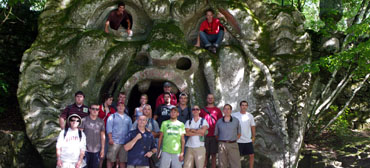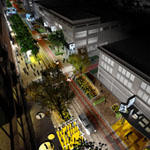Department Mission
We strive to advance landscape architecture excellence through thoughtful development
of designers and advocates in a multi-disciplinary, place-responsive education transferable
across scales, technologies and locations, in service to Arkansas, the nation and
the world.
The faculty in the landscape architecture program aspires to produce skilled designers with advocacy know-how. Students graduate with a range of experiences, working with various communities, organizations and sites. Our students are critical thinkers with the ability to solve problems across planning, design and construction. In addition to this professional platform, students have a scaffold in place to build their identities as advocates, while learning advocacy through real-world projects. The curriculum facilitates an understanding of context and culture, as students gain effective communication skills to engage with community members and collaborators. The curriculum develops a foundation of knowledge, skills and abilities for competency and leadership, equipping future design professionals to shape a more just and sustainable world.
Design DNA – A Framework for Practice
The faculty in the Department of Landscape Architecture advocates for design based
upon six components that comprise our Design DNA, which is meant to be timeless, relevant
to contemporary practice, and a framework to prepare designers for future work in
landscape architecture, planning and sustainability. The Design DNA permeates all
courses in the curriculum, and designers use these strands to develop meaningful analysis,
research, design and implementation.
- Advocacy helps students, faculty and practitioners work together and communicate their ideas from a collaborative and context-sensitive perspective.
- History/Culture involves understanding and using time, place, land and people as a foundation for action.
- Ecology/Justice employs a scientific and social platform for equitably relating people to resources to establish a harmonious relationship with ecological resources.
- Urbanization focuses on analyzing and designing for the new and future geographies of human settlement from cities and suburbs to towns and rural areas.
- Resilience equips designers to establish just and sustainable solutions that facilitate mitigation, adaptation and transformation in a world of rapid change.
- Technology calls for using the appropriate tools to develop and construct work through the research, analytical and design processes.
Students have several opportunities to augment their education by creating focus areas through minors and engaging in honors courses. The Department of Landscape Architecture offers planning, sustainability and planting design minors. Fay Jones School students can also access other minors related to interior design, architectural studies, and historic preservation and practice.
Find out more about our program in this Landscape Architecture Fact Sheet.
Find the school's Faculty Personnel Document here.









